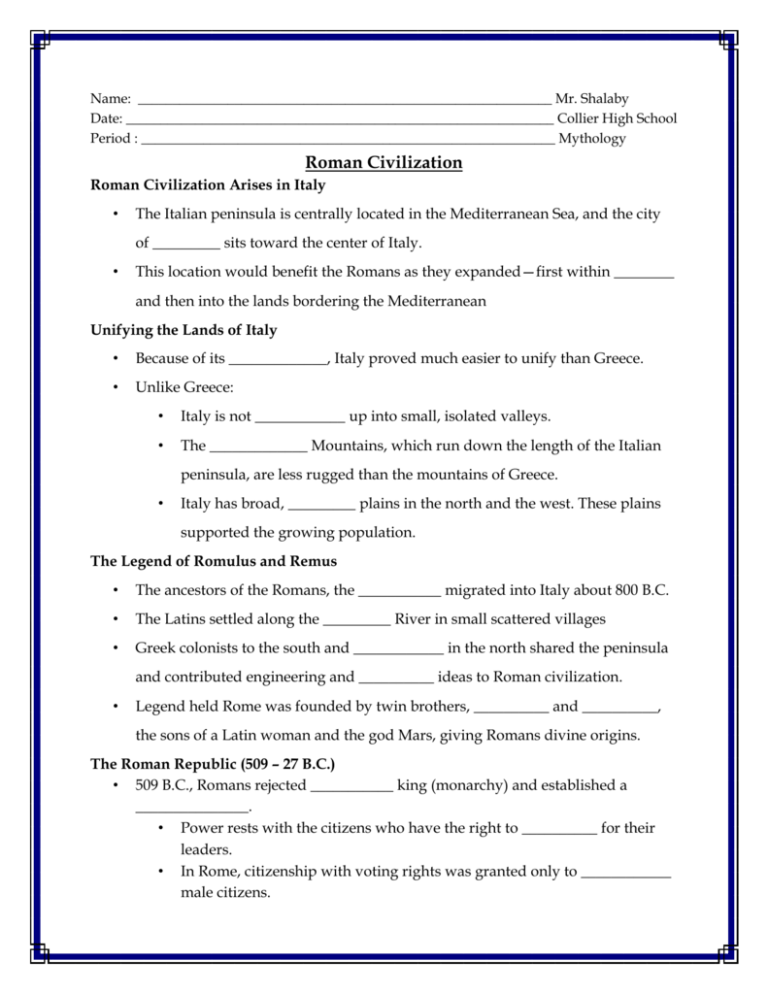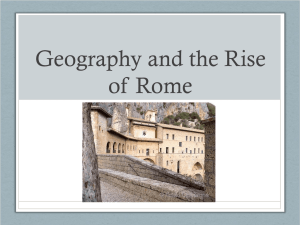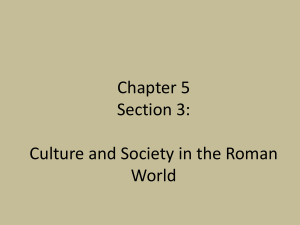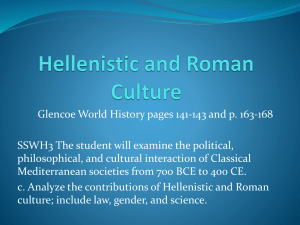Ancient Rome - Collier High School
advertisement

Name: ____________________________________________________________ Mr. Shalaby Date: ______________________________________________________________ Collier High School Period : ____________________________________________________________ Mythology Roman Civilization Roman Civilization Arises in Italy • The Italian peninsula is centrally located in the Mediterranean Sea, and the city of _________ sits toward the center of Italy. • This location would benefit the Romans as they expanded—first within ________ and then into the lands bordering the Mediterranean Unifying the Lands of Italy • Because of its _____________, Italy proved much easier to unify than Greece. • Unlike Greece: • Italy is not ____________ up into small, isolated valleys. • The _____________ Mountains, which run down the length of the Italian peninsula, are less rugged than the mountains of Greece. • Italy has broad, _________ plains in the north and the west. These plains supported the growing population. The Legend of Romulus and Remus • The ancestors of the Romans, the ___________ migrated into Italy about 800 B.C. • The Latins settled along the _________ River in small scattered villages • Greek colonists to the south and ____________ in the north shared the peninsula and contributed engineering and __________ ideas to Roman civilization. • Legend held Rome was founded by twin brothers, __________ and __________, the sons of a Latin woman and the god Mars, giving Romans divine origins. The Roman Republic (509 – 27 B.C.) • 509 B.C., Romans rejected ___________ king (monarchy) and established a _______________. • Power rests with the citizens who have the right to __________ for their leaders. • In Rome, citizenship with voting rights was granted only to ____________ male citizens. • Struggle For Power: Class Conflict. • Patricians – Wealthy _____________ who held most of the power: inherited power and social status. • Plebeians (Plebs) – common ___________, artisans and merchants who made up the ____________ of the population: can vote, but can’t rule. • • ____________ – elected representatives who protect plebeians’ political rights. The Roman Republic – A “Balanced” Government. • Rome elected two _________ – one to lead army, one to direct government. • __________ – chosen from patricians (Roman upper class), make foreign and domestic policy. • Popular assemblies elect ____________, make laws for plebeians (commoners). • Dictators – leaders appointed briefly in times of crisis (appt. by consuls and ___________). Structuring the Republic • In the early republic, the most powerful governing body was the ___________. Originally, its 300 members were all _____________, or members of the landholding upper class. Senators, who served for life, strongly influenced the republic’s _____________ Rome elected two consuls • Each year, the senators nominated __________ consuls from the patrician class. • Their job was to ____________ the business of government and command the armies. • Consuls, however, could serve only ___________ term. They were also expected to approve each other’s _______________. • By limiting their time in office and making them __________ to each other, Rome had a system of checks on the power of government The Dictator • In the event of ________, the senate might choose a dictator, or ruler who has complete control over a government. Each Roman dictator was granted power to rule for _________ months. After that time, he had to give up power. Cincinnatus • Romans particularly admired ________________ as a model dictator. • Cincinnatus organized an army, led the Romans to victory over the attacking enemy, attended victory celebrations, and returned to his ____________—all within 15 days. Plebeians Fight for Their Rights • At first, all government officials were patricians. Plebeians (plih bee unz), the farmers, merchants, artisans, and traders who made up the bulk of the population, had little __________. The efforts of the plebeians to gain power shaped politics in the early republic • In time, the plebeians gained the right to ______________ their own officials, called tribunes, to protect their interests. • The tribunes could ____________, or block, those laws that they felt were harmful to plebeians. • Little by little, plebeians forced the senate to choose ______________ as consuls, appoint plebeians to other high ___________, and finally to open the senate itself to plebeians. • Another breakthrough for the plebeians came in 450 B.C., when the government oversaw the inscription of the laws of Rome on 12 tablets, which were set up in the ___________, Rome’s marketplace. Plebeians had protested that citizens could not know what the laws were because they were not _____________ down The Twelve Tables • The Laws of the ______________ Tables made it possible for the first time for plebeians to appeal a ________________ handed down by a patrician judge. Characterizing Roman Society • The ___________ was the basic unit of Roman society. • Under Roman law, the _________ head of the household had absolute authority. • Women could own property and run _____________, but most worked at home. • Children were ____________. The wealthy often hired _____________ tutors. The Role of Women Changes Over Time • Roman women played a larger ___________ in society than did Greek women. • They could own __________, and, in later Roman times, women from all classes ran a variety of ______________, from small shops to major shipyards. • Those who made their ______________ earned respect by supporting the arts or paying for public _______________. • However, most women worked at ____________, raising their families, spinning, and weaving • Over the centuries, Roman women gained greater freedom and ______________. • Patrician women went to the public baths, dined out, and attended the ____________ or other forms of public entertainment with their husbands. Romans Educate all Children • Both girls and boys from the upper and lower classes, all ____________ to read and write. • By the later years of the republic, many ______________ Romans would hire private tutors, often Greeks, to supervise the education of their children. • Under their guidance, children memorized major events and developments in Roman history. _______________ was an important subject for boys who wanted to pursue ________________ careers. Roman Religious Practices • Roman religion develops out of Greek and _____________ religions • The Romans believed in ______________ gods and goddesses, many of whom they adapted from Greek Mythology and Religion. • Throughout Rome, dozens of ________________ housed statues of the gods. • In front of these temples, Romans took part in ________________ activities such as worshipping the gods and asking for divine assistance. Roman Festivals • The Roman calendar was full of ___________ and other celebrations to honor the gods and goddesses and to ensure divine _________ for the city. As loyal citizens, most Romans joined in these festivals, which inspired a sense of ______________. The Roman Republic Grows • As Rome’s political and social systems evolved at home, its armies expanded Roman power across _____________. • Roman armies _____________ first the Etruscans and then the Greek city-states in the south. • By about 270 B.C., Rome controlled most of the Italian peninsula. Citizen-Soldiers Make Up the Roman Army • Rome’s success was due to skillful ____________ and to its loyal, well-trained _______________. • All __________ were required to serve. • The basic military unit was the ___________, each of which included about 5,000 men. • As in Greece, Roman armies consisted of ____________-soldiers who originally fought without being paid and had to supply their own weapons Roman soldiers • Eventually, they received a small __________, or payment, but their main compensation was always a share of the ____________ of victory. Roman citizens often made good soldiers because they were brought up to value _____________, courage, and respect for authority. Roman Military • To ensure success, Roman commanders mixed ________ with harsh punishment. • Young soldiers who showed _____________ in action won praise and gifts. • If a unit fled from battle, however, one out of every ________ men from the disgraced unit was put to death. Rome Is Just With Conquered Lands • Rome generally treated its defeated enemies with __________. Conquered peoples had to acknowledge Roman ___________, pay taxes, and supply soldiers for the Roman army. In return, Rome let them keep their own customs, ________, and local government. Rome Is Just With Conquered Lands • To a few __________ groups among the conquered people, Rome gave the highly prized right of full ________________. • Others became partial citizens, who were allowed to _______________ Romans and carry on trade in Rome. • As a result of such generous policies, most conquered lands remained _________ to Rome even in troubled times. Maintaining the State • To protect its ___________, Rome posted soldiers throughout the land. • It also built a ____________ of all-weather military roads to link ______________ territories to Rome. As trade and _____________ increased, local peoples incorporated __________ into their languages and adopted many Roman _____________ and beliefs. Slowly, Italy began to unite under Roman rule. Section 2: From Republic to Empire • When ____________ came to power in 31 B.C., he ended the Roman republic and made Rome an _____________. • Rome added many _____________ lands to the republic and gained control of important __________ routes. The Roman Achievement • Roman civilization spread to faraway lands • Romans also borrowed ideas from other cultures • The blending of Greek, _______________, and Roman cultures is called ____________________ civilization • • Roman artists, _____________, and writers borrowed ideas from these different cultures • The Romans used Greek ___________ in their homes and public buildings • Romans adapted the ____________ Hellenistic style • Statues shows every detail of a subject, even warts and veins Roman builders used Greek columns • • However Roman buildings were mighty and __________ rather than simple and elegant Many Romans spoke ____________ and used Greek ____________ styles • Still, the greatest Roman writers such as __________, Horace, and Livy used the Roman language of Latin for _______________. • Romans were practical • They built excellent ___________, bridges, harbors, and aqueducts, or bridge-like stone structures that brought water from the hills to the cities • The Romans did little _______________ investigation • • They did, however, put science to practical use The used _______________ to make maps and medical knowledge to improve public health • The Romans also developed an important system of law • Under this system, people were ____________ until proved guilty • Decisions were based on _____________. • Roman law influenced the modern legal systems of the Americas and Europe









